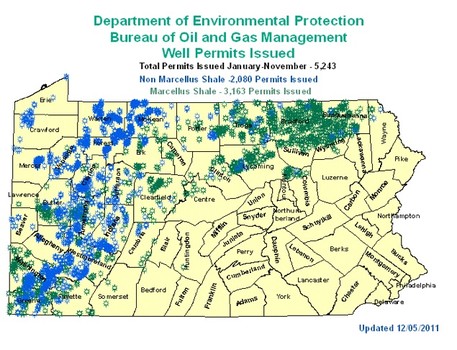The Pennsylvania Department of Environmental Protection announced on Thursday that operators of unconventional gas wells will no longer be unconditionally exempt from seeking an air quality plan approval for well sites. Instead, guidance issued by the DEP explains the agency may grant unconventional gas well operators permit exceptions if they implement controls and practices more stringent than federal rules.
The phrase “unconventional gas well” refers to the sites using hydraulic fracturing, primarily in the Marcellus Shale.
“Governor Corbett’s continued leadership on energy and environmental issues has put Pennsylvania in a unique position – air quality has improved over the past few years at the same time the state’s energy portfolio continues to expand the development and use of natural gas. We fully expect both of those trends to continue, and this strategy builds on existing federal requirements by continuing to set the high, but fair, bar we have come to expect,” DEP Acting Secretary Chris Abruzzo said.
In April 2012 the U.S. Environmental Protection Agency announced national air quality rules for oil and gas sites.
However, earlier this year the DEP put forth a proposal to amend technical guidance detailing which emissions sources would not be required to obtain air quality plan approvals from the state. Previously, oil and gas well sites in Pennsylvania had been granted blanket exemptions from obtaining approvals since 1996.
Under the new guidance, each operator chooses between seeking an air quality plan approval from DEP, or demonstrating and implementing controls and practices more stringent than the federal rules.
The DEP process is more stringent than federal rules. For example, it includes practices such as a leak detection and repair program for the entire well pad and facility, rather than just the storage vessels as required by federal rules. DEP also requires nitrogen oxide emissions to be less than 100 pounds per hour, half a ton per day and 6.6 tons per year, while the EPA has no requirement at all.
The DEP is also moving to limit open flaring of gas to short term or emergency situations. Flaring within an enclosed vessel reduces emissions of volatile organic compounds and hazardous air pollutants.
The effect of this is to stop giving blanket permission to any oil or gas well operator but to require some emissions controls.
- The USA should delete Musk from power, Instead of deleting whole agencies as he demands - February 14, 2025
- Elon Musk, fiduciary duties, his six companies PLUS his political activities - February 10, 2025
- Is there enough Grid Capacity for Hydrogen Fuel Cell or Battery Electric cars? - April 23, 2023
- Is Tesla finagling to grab federal NEVI dollars for Supercharger network? - November 15, 2022
- Tesla announces the North American Charging Standard charging connector - November 11, 2022
- Lightning Motorcycles adopts Silicon battery, 5 minute charge time gives 135 miles range - November 9, 2022
- Tesla Autopilot under US Dept of Transportation scrutiny - June 13, 2022
- Spectacular CNG bus fire misrepresented as EV bus fire - April 21, 2022
- Moldova, Ukraine, Georgia, Russia, and the European Energy Crisis - December 21, 2021
- Li-Bridge leading the USA across lithium battery chasm - October 29, 2021












